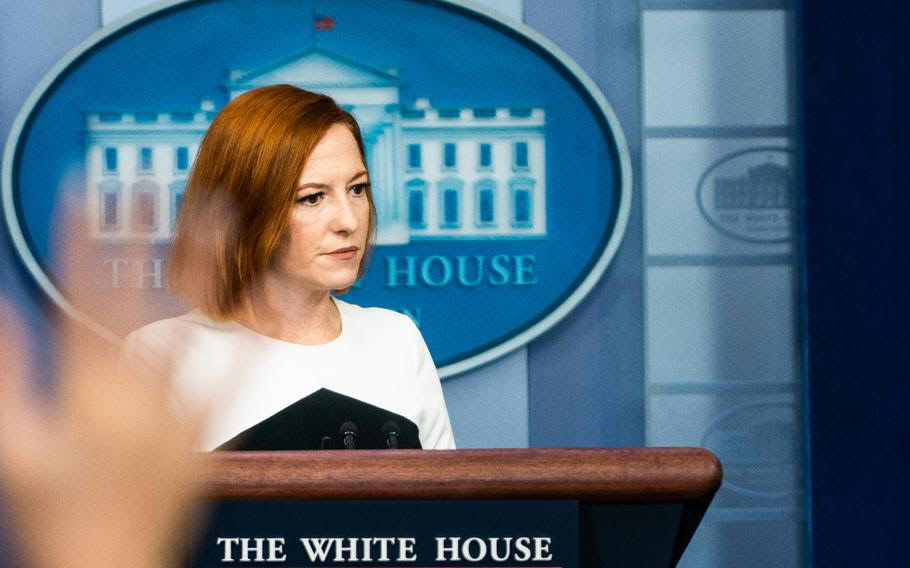Pushback over calling this a ‘pandemic of the unvaccinated’
3 min read
The emergence of the highly infectious – even for vaccinated and boosted people – omicron variant has set off a new debate over how to talk about and confront the coronavirus pandemic. To some, this undercuts both the Biden administration’s chief talking point on vaccines and its push to require vaccines or testing.
Two relevant examples
– At both a White House briefing and in an interview with the head of the Centers for Disease Control and Prevention in recent days, Fox News challenged President Joe Biden’s talking point that this is a “pandemic of the unvaccinated.” Fox’s Peter Doocy on Monday noted that two people – both he and White House press secretary Jen Psaki – became infected after three doses. “Why is the president still referring to this as a ‘pandemic of the unvaccinated?’ ” he asked Psaki. Likewise, Fox’s Bret Baier on Sunday asked CDC Director Rochelle Walensky, “How is it that ‘pandemic of the unvaccinated’ is a terminology that should be used?”
Separately – and more substantially – critics are challenging Biden’s vaccine-or-testing mandate by citing the increased breakthrough infections amid the omicron variant. The purpose of such vaccine mandates, after all, is generally to prevent the spread. “Omicron Makes Biden’s Vaccine Mandates Obsolete,” reads an op-ed in the Wall Street Journal.
These arguments have been around for a while. They first cropped up when the vaccines proved less effective against the delta variant than their previous 90-plus-percent efficacy rates. But they now feature renewed vigor as the omicron variant has rendered the vaccines even less effective against omicron infection – while still very effective against hospitalization and death.
But as with before, the arguments very often skip over the nuance, pretending there’s little to no distinction between preventing all infections and preventing some or even lots of infections. They also ignore lots of early studies on the efficacy of boosters.
Even this week, anti-vaxxers and vaccine-mandate opponents resurfaced an old clip of Walensky saying in August that what the vaccines “can’t do anymore is prevent transmission.” The WSJ op-ed states that there is no “evidence that the vaccines are effective in stopping the spread of the pathogen they target,” and thus the mandates are ill-founded and wrong. (The op-ed was written in part by a Nobel laureate with a colorful past of questioning vaccine mandates, as well as a Yale Law School professor suspended for alleged sexual harassment.)
That claim is certainly a suspect one. While it’s become clear the vaccines are less effective at stopping the spread amid omicron, that doesn’t mean there is no evidence that they help. Early studies have shown that they continue to help greatly when it comes to preventing hospitalization and death, but they also reduce infections – particularly when they include boosters.
A study from the United Kingdom Health Security Agency last month found that the two-shot Pfizer-BioNTech and Moderna vaccines by themselves were only about 10% effective at preventing symptomatic infection 20 weeks after the second dose. But the effectiveness rate increased to 75% two to four weeks after a booster.
In Israel, a study of health-care workers – written up by the Wall Street Journal itself – found that boosters increased antibody levels by about 100 times when compared with two doses alone.
Another study from Imperial College London found that the two-dose Pfizer and AstraZeneca vaccines (the latter is not available in the United States) were between 0 and 20% effective against symptomatic infection, but those numbers rose to between 55 and 80% after a booster.
And a major study in South Africa, where the omicron variant was detected early on, found that two doses of the Pfizer vaccine – again, without a booster – provided 33% protection against infection, while providing 70% protection against hospitalization.
These studies suggest that there is significantly reduced benefit against infection from just two doses, but some studies show even those two doses might provide a measurable benefit, and adding boosters significantly increases that benefit.



